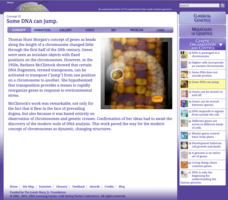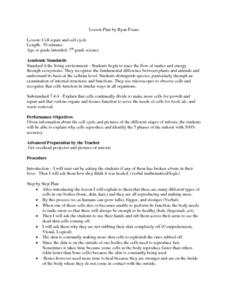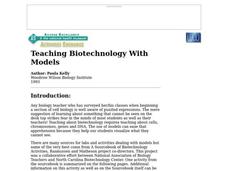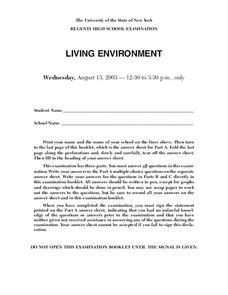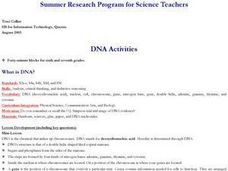Curated OER
Genome: A Tour and Genetic Disorder Brochure
Students use the Internet to gather information about genetics, then research a genetic disorder. In this biology lesson, students listen to an interview with a geneticist, watch an animation of "chromosome coiling", then research and...
Biology Junction
Cellular Division
Based on current scientific knowledge, all cells come from preexisting cells. Scholars learn about cell division, cell replication, mitosis, meiosis, and more with a PowerPoint. It describes the differences between prokaryotes and...
Cold Spring Harbor Laboratory
Some DNA Can Jump
Some people have a natural ability to jump, but did you know DNA also naturally jumps? Learn about the fun habit by looking at the research of a pioneering female scientist. Barbara McClintock fought prejudice and surpassed her mentors...
Oklahoma State University
Hairy Heredity
Young scholars learn that heredity comes down to the flip of a coin with this cross-curricular math and science lesson. Using smiley faces as a model, students toss coins to determine which dominant or recessive traits...
Virginia Department of Education
Cell Division
Searching for simple ways to teach mitosis to high schoolers? Using colored chalk and onion root tips, pupils visually demonstrate what they view when looking through the lens of a microscope. There are also various ways to expand the...
Curated OER
Reaching Into Your Genes
Young scholars interact with a video to explore the basis for the science of chromosomes. They perform a chromosomal analysis called a karyotype and explore how seemingly minute errors in chromosomes can lead to devastating illnesses.
Curated OER
Genetic Vocabulary Review
In this genetics vocabulary worksheet, students answer 13 multiple choice questions about the structure and function of genes.
Curated OER
TE Lesson: What's Dominant?
Students study the number of chromosomes in the body cells, sperm cells, and egg cells of humans. They define allele, and examine the difference between dominant and recessive alleles. They complete an activity with jelly beans that...
Curated OER
Investigating DNA
Students engage in a variety of activities designed to facilitate the understanding of DNA. Activities include preparing human chromosome spreads, separating a mixture of dyes using gel electrophoresis and extracting DNA from onion cells,
Curated OER
Bacteria
In this bacteria learning exercise, students fill in the blanks with the correct word. Students then label the structures found on a bacterium.
Curated OER
Review of Cell Organelles
In this cell organelles activity, students read the structure and function of different plant and animal cell organelles to determine what organelle is being described. Students write in the 15 organelles into a chart.
Curated OER
Gene Action/Mutation Worksheet
Learners define the following terms: mutation, mutagen and give examples of how they work. They also define and illustrate a point mutation. Students define and illustrate a frame shift mutation and name two types of frame shift...
Curated OER
Teaching Biotechnology by Analogies and Models
Students examine analogies and create models to help visualize the concept and technique of basic biotechnology. Common scenarios are used to explain the complex procedures of genetic engineering.
Curated OER
DNA Questions
For this forensic science worksheet, students analyze the characteristics and uses of DNA to complete 26 short answer questions.
Curated OER
Cell Repair and Cell Cycle
Seventh graders explore the cell cycle. They view pictures of different stages of mitosis and explain why cells reproduce. They identify the five phases of mitosis: interphase, prophase, metaphase, anaphase, and telophase.
Curated OER
Teaching Biotechnology With Models
Students are introduced to biotechnology by using models. The teacher uses A Sourcebook of Biotechnology Activities, Rasmussen and Matheson project co directors. One of the activities in the book is: students use a scale models to very...
Curated OER
Design Yer Genes
Seventh graders explore general structure of and natural changes that occur in DNA strands, and discuss concept of genetic engineering by creating small portion of strawberry chromosome with three genes, modeling naturally occurring...
Curated OER
Living Environment
In this environmental lesson students complete a series of multiple choice and short answer questions on animal populations, cell structure and chromosomes.
Curated OER
DNA Activities
Students work together to identify the structure of DNA. They practice using new vocabulary as well. They create a 3-D model of DNA to complete the lesson.
Curated OER
Karyotype Alternatives
Students study karyotyping, which is a process in which chromosomes are cut out from an enlarged picture and arranged in decreasing order of size. They use a template to arrange and glue chromosomes to data sheet, indicate sample code,...
Curated OER
Genetics 4 Mutations
Students identify and illustrate how changes in DNA cause mutations and evaluate the significance of these changes. They illustrate a chromosomal mutation such as duplication, deletion, inversion, and translocation.
Curated OER
Meiosis, Gene Linkage and Maps
Students identify the structures that actually assort independently. They are taught how gene maps are produced. Students compare the processes of mitosis and meiosis. They are shown their (mitosis and meiosis) significane to sexual...
Curated OER
Mitosis and Meiosis Exercise
In this cell division worksheet, students answer 13 multiple choice questions based on the process of mitosis and meiosis. Included are questions about the stages of cell division as well as the structures involved.
Curated OER
DNA and Protein Synthesis in the Cell
High schoolers explore how DNA fits into chromosomes and how chromosomes relate to the human body. Students learn about DNA replication and protein synthesis and model these two processes.




